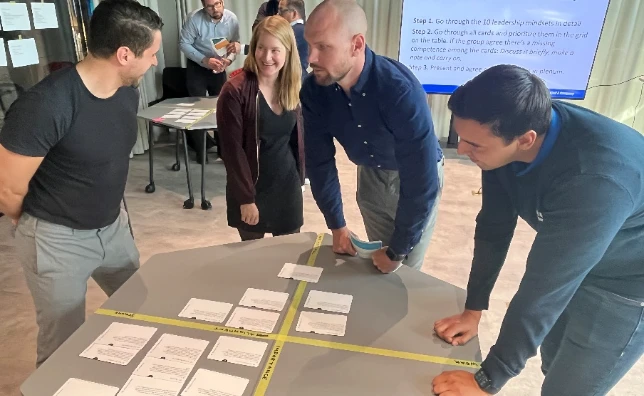
Change & OD | Culture | Leadership | Talent management
Enhancing performance through leadership in both structure and culture
Company: Kjell Group
Background
Kjell Group aimed to enhance collective leadership and foster a performance-driven culture through clarity and feedback. The primary goal was to increase individual performance using a growth-oriented approach. This initiative involved identifying leadership roles, defining performance management capabilities, implementing a reward structure, and designing a comprehensive leadership learning journey.
The needs and delivered solution
Leadership for All and Leadership competence models
Identification of leadership roles: Through interviews and high-level involvement of employees, managers, the “Women at Kjell” forum, and the management team, several types of leaders were identified.
Defining leadership behaviors: Based on guiding principles such as mission, vision, values, and strategic priorities, as well as data on challenges, leadership benchmarks, and emerging trends, concrete value-adding leadership behaviors were defined for each leadership role.
Collective performance management capability
Framework development: Performance was defined as delivered results and demonstrated leadership. A comprehensive framework for individual performance management was developed through an iterative process involving employees and managers.
Integration and training: The framework was integrated into the human capital management platform. A comprehensive toolbox was developed, and managers and employees were trained in goal-setting and coaching.
Open space workshop
Driver identification and action planning: In an Open Space workshop, the drivers of the BHAGs and key results were identified. Owners were appointed, and action plans were drafted. The team also decided on the data needed to track results and established a structure for follow-up and support.
Reward structure
Pay for performance: A “pay for performance” system was implemented with an emphasis on demonstrated leadership. This signaled the importance of leadership as a major driver of goal achievement and future results.
Leadership learning journey
Design and implementation: A high-impact learning journey was designed with blended learning activities, bite-size material, and full integration into Kjell & Co’s view on leadership and internal leadership processes.
Program success: The program achieved 96% of its goals and received an NPS of 88 from participants. All participants reported spending less time on individual contributor tasks and more time on leadership activities, with a commitment to continue developing their leadership skills.

By addressing these needs, Kjell Group aimed to create a strong foundation for collective leadership and a performance-driven culture. This comprehensive approach ensured that leadership roles were clearly defined, performance management capabilities were enhanced, and a robust reward structure was in place to drive long-term success and individual growth.

Jenny Hillerström-Schuldt
CPCO, Kjell & Co
Fenix elevated the quality of leadership among our staff, supporting in fostering a culture of excellence and growth. He is a natural leader with a keen eye for leadership and organisational development. His ability to inspire and drive positive change is amazing. I wholeheartedly recommend Fenix.

Jenny Hillerström-Schuldt
CPCO, Kjell & Co
Fenix elevated the quality of leadership among our staff, supporting in fostering a culture of excellence and growth. He is a natural leader with a keen eye for leadership and organisational development. His ability to inspire and drive positive change is amazing. I wholeheartedly recommend Fenix.
Results
133% increase in the number of employees with clear and agreed objectives (from 40% to 93%).
Increase in managers actively encouraging and supporting their employees in setting ambitious and SMART objectives. Well-performed coaching conversations, where employees evaluated manager support to be high, goal quality to be good, and dialogue around leadership development needs to be relevant, contributed highly to individual performance (R²=0.42, p=0.00).
Reduction from 20% of employees not receiving any type of feedback, and 17% receiving feedback on their leadership, to 5% not receiving any type of feedback and 54% receiving recurring feedback on their leadership.
Increase in leadership fit-for-purpose from 82 points to 92 points. Analysis showed that the defined leadership competences could explain 15% (p=0.00) of goal contribution and hence added direct business value. Among Service Point Managers, the monetary value of developing adequate leadership was calculated to be approximately 1% of the annual gross profit (10 Msek / year).
With a growth-oriented approach, the number of low-performing employees was reduced by 64% (from 11% to 4%) in a tough macro-economic context and market situation.
Are you too ready to drive business results through strategic HR and organisational development?
Contact me for tailored advice and solutions. Click below to start the conversation!
